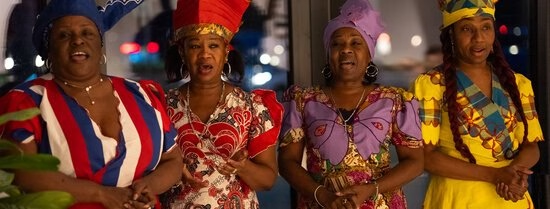Today is Keti Koti, the annual commemoration of the history of slavery in the former Dutch colonies. July 1, 2024, is the ultimate day of the 150th anniversary of the abolition of slavery which was commemorated and celebrated in various ways throughout our country.
‘It’s beautiful to see how your dialogue partner views life and how they regard this topic.’ - Peggy Wijntuin, advisor on Dutch slavery and colonial past
‘I truly hope that everyone leaves this room with a sense of relief. With the feeling: I have been able to speak my mind. I feel heard.’ - Larissa Minnaard, student and chair of Surinamese Students Abroad (SSA)
This year we organised a Keti Koti Dialogue Table at our university to talk about our shared colonial past and its consequences. The event featured a communal dinner with a variety of dishes inspired by Surinamese cuisine, as well as inspiring speeches about Civil Courage versus Silence.
Between conversations, the Fri Yeye Choir sang songs of mourning and liberation which were sung on the plantations in the former Dutch colonies. It was a truly special and moving evening, with students and staff from various backgrounds coming together.
The dialogues allowed our Erasmian community to counter prejudice and discrimination, and to strengthen mutual empathy and compassion.
Commemorating and celebrating
The 150th anniversary of the abolition of slavery was commemorated and celebrated in Rotterdam in many ways:
- Routes through Rotterdam. To learn more about Rotterdam's colonial past, the app "Koloniaal Rotterdam" was created. This app allows you to walk routes along locations that have a link to this past of Rotterdam. In addition to text, sound and images, augmented reality (AR) and virtual reality (VR) have been added. Koloniaal Rotterdam is available for educational purposes and for the general public.
- Conference. Last September there was a conference at the Hogeschool Rotterdam about how the history of slavery still affects our society today.
- Free Heri Heri for all. Heri Heri is a Surinamese dish that originated from what remained on the plantation and was grown and eaten by the enslaved ancestors. The dish as we know it today consists of boiled sweet potato, cassava, yellow and green banana, salted fish (bakkeljauw), an egg and garnishes. On June 30 and July 1, free dishes will be handed out at various locations in Rotterdam (and other cities).
- Keti Broko Festival: The Bona Dea Foundation once again organized the Keti Broko Festival yesterday, an event dedicated to the celebration of freedom and connection of Surinamese and other cultures. The festival took place at Mallegat Park. Naturally, the commemoration of the abolition of the transatlantic slave trade and the important moment when slavery was abolished in the former colonies of the Netherlands was celebrated. This was done with dialogue, and understanding and connection between different communities. A range of cultural, educational and artistic activities explore the legacy of diverse cultures, celebrate cultural diversity and contribute to a more inclusive future.
- Museums and theaters. Several institutions, such as Wereldmuseum, Kunsthal, Lantaren Venster, Theater Rotterdam and Theater Zuidplein offered exhibitions and performances around this theme.
Together we strive for a more inclusive and just future.

